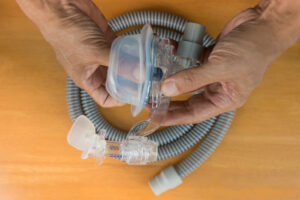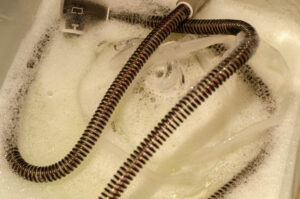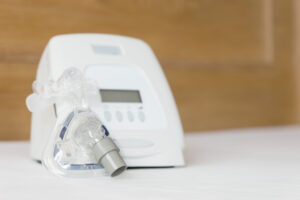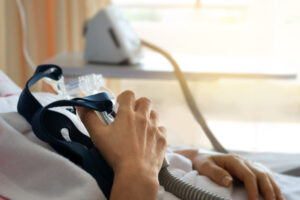Experts and device manufacturers typically recommend only putting distilled water in the humidifier of a continuous positive airway pressure (CPAP) machine. Using distilled water prevents the buildup of minerals that can affect how well a CPAP works.
CPAP machines are commonly used to treat sleep apnea, but the flow of air from the device can dry out the mouth, nose, and throat. Humidifiers in CPAPs are designed to address this side effect. Choosing the right type of water for the humidifier can promote optimal CPAP performance.
Key Takeaways
- Distilled water is recommended for optimal CPAP performance.
- Minerals in tap water and some bottled water can build up in a CPAP device.
- Avoid putting untreated tap water in a CPAP humidifier.
- If distilled water isn’t available, try purified bottled water or filtered tap water.
- To prevent mineral buildup, wash your CPAP more frequently if you aren’t using distilled water.
Why You Should Only Use Distilled Water
Distilled water does not have minerals or germs, so using distilled water in a CPAP humidifier helps keep residue and unwanted germs out of the device.
To produce distilled water, steam from boiling water is captured, condensed, and stored in sanitized bottles. In the process, minerals and organisms like bacteria are removed.
Mineral buildup can affect the performance of a CPAP machine, which is why manufacturers recommend only using distilled water. Distilled water is also free of microbes, helping to prevent inhalation of germs when using a CPAP.
Can You Use Tap Water In a CPAP Machine?
Whenever possible, you should avoid using tap water in a CPAP machine. Tap water contains minerals that can collect in the machine. This mineral residue can impact the cleanliness and performance of your CPAP device.
If your home uses well water or other untreated tap water, there may be health risks from putting tap water into your CPAP. Although uncommon, cases have been reported of respiratory illness arising from microbes in untreated water used in a CPAP humidifier.
Although not recommended, you can use tap water in your humidifier if you have no other option. In this situation, it’s ideal to filter tap water first. While using tap water for one or two nights may not cause major mineral buildup, you should clean your CPAP more frequently when using tap water for any extended period.
Can You Use Bottled Water In a CPAP Machine?
Some bottled water can be used in a CPAP machine, but it is important to look closely at the label. Not all bottled water is the same, and some types are not recommended for CPAP humidifiers. The best option is to use bottled distilled water.
If distilled water is not available, you can use purified bottled water as long as it does not have minerals added to it. However, you should clean your CPAP more often if you regularly use purified water.
While FDA regulations help make bottled water safe to drink, this doesn’t mean that all bottled water can be used in a CPAP. You should avoid mineral water, spring water, and any other bottled water with added minerals or flavors.
Cleaning Your CPAP and Humidifier
Keeping your CPAP machine clean enables it to function properly while decreasing your exposure to germs that could make you sick. You can wash most CPAP parts with warm, soapy water.
In general, you do not need to use distilled water to clean your CPAP machine. However, you should use a mild soap or, in some cases, a mixture of water and distilled white vinegar.
For cleaning instructions specific to your device, look in the user manual or check with the manufacturer. Absent other guidance, you can wash CPAP parts with water and a gentle soap.
On a daily basis, you should empty the humidifier chamber and wipe down your mask cushion. Every week, you should thoroughly clean your mask, headgear, and tubing. If your device uses a removable filter, clean it weekly.
Some CPAP supplies need to be replaced on a regular schedule. These include a disposable filter, masks, mask cushions, headgear, and tubing. Check the user manual for a recommended schedule for replacing parts. At any point, you should replace these items if they become damaged or stained.
References
Ask the Sleep Doctor
Have questions about sleep? Submit them here! We use your questions to help us decide topics for articles, videos, and newsletters. We try to answer as many questions as possible. You can also send us an email. Please note, we cannot provide specific medical advice, and always recommend you contact your doctor for any medical matters.





